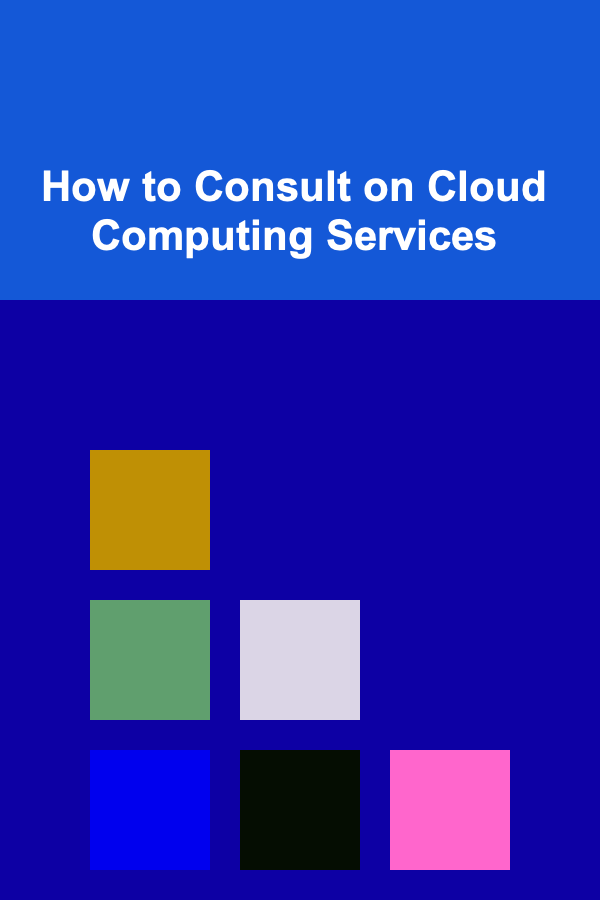
How to Consult on Cloud Computing Services
ebook include PDF & Audio bundle (Micro Guide)
$12.99$6.99
Limited Time Offer! Order within the next:

Cloud computing has revolutionized the way businesses and individuals access, store, and manage data. As more companies migrate to the cloud, the demand for cloud computing consultants has skyrocketed. A cloud computing consultant offers expertise in designing, implementing, and managing cloud-based solutions, helping businesses to optimize their operations and improve scalability.
In this comprehensive guide, we will explore how to consult on cloud computing services, including key skills, methodologies, and practical steps. Whether you're an aspiring cloud consultant or an established expert, this article will provide valuable insights into effectively offering cloud consulting services.
What is Cloud Computing?
Before diving into the specifics of consulting, it's crucial to understand what cloud computing is and why it's so valuable to modern organizations.
Cloud computing refers to the delivery of computing services---such as storage, processing power, databases, networking, software, and analytics---over the internet. Instead of hosting these resources on local servers or computers, cloud computing allows organizations to access them via the cloud.
There are three primary models of cloud computing:
- Infrastructure as a Service (IaaS): Provides virtualized computing resources over the internet. Examples include Amazon Web Services (AWS), Microsoft Azure, and Google Cloud.
- Platform as a Service (PaaS): Offers a platform that allows customers to develop, run, and manage applications without worrying about the underlying infrastructure. Examples include Heroku and Microsoft Azure.
- Software as a Service (SaaS): Delivers software applications over the internet on a subscription basis. Examples include Google Workspace, Salesforce, and Dropbox.
Cloud computing allows businesses to scale quickly, reduce IT costs, and access cutting-edge technologies without the need for extensive physical infrastructure.
Skills Required for Cloud Computing Consulting
To effectively consult on cloud computing services, consultants must have a mix of technical expertise, business acumen, and communication skills. Here are the key skills that every cloud consultant should have:
1. Technical Proficiency
A solid foundation in cloud computing technologies is essential. Consultants need to be well-versed in the following areas:
- Cloud Platforms: Familiarity with major cloud providers (AWS, Microsoft Azure, Google Cloud) is essential. Understanding the nuances of each platform's capabilities and pricing models allows you to advise clients on the best solutions for their needs.
- Networking and Security: Cloud computing introduces unique challenges in terms of network management and security. A consultant must understand cloud networking, firewalls, VPNs, and encryption.
- Databases: Proficiency with cloud-based database services (such as Amazon RDS, Google Cloud SQL, and Azure SQL Database) is crucial for advising clients on scalable and secure data storage.
- DevOps and Automation: Knowledge of DevOps practices and tools like Docker, Kubernetes, and Jenkins can help automate cloud infrastructure management, improving efficiency and reliability.
- Serverless Architecture: An understanding of serverless computing models, where the provider handles server management, allows you to suggest cost-effective solutions.
2. Business and Industry Knowledge
Consultants must be able to align technical solutions with the client's business needs. Understanding how the client's industry operates is important for proposing relevant cloud services. For instance, a cloud consultant working with a healthcare client should be familiar with compliance regulations such as HIPAA (Health Insurance Portability and Accountability Act) in the U.S.
3. Project Management Skills
Cloud consulting often involves managing projects, from initial planning to deployment. Consultants should be able to:
- Define project goals and timelines
- Coordinate teams
- Manage budgets
- Ensure smooth execution and delivery
4. Communication Skills
As a cloud consultant, you must be able to translate complex technical jargon into simple language that clients can understand. This skill is vital when explaining the benefits, risks, and costs associated with cloud solutions. Moreover, consultants need to communicate effectively with internal teams and clients, fostering collaboration and understanding.
Steps to Consult on Cloud Computing Services
Now that we've covered the skills needed, let's delve into how to effectively offer cloud computing consulting services.
1. Identify Client Needs
The first step in the cloud consulting process is to understand the client's business objectives. Every organization has unique needs, and your job as a consultant is to tailor cloud solutions that will deliver value.
- Conduct Initial Assessment: Meet with key stakeholders to understand their business goals, challenges, and technology requirements.
- Evaluate Current Infrastructure: Assess the client's current IT infrastructure to determine if it's scalable, cost-effective, and secure. This may involve reviewing their on-premise servers, storage solutions, and application architecture.
- Understand Compliance and Security Needs: Depending on the industry, the client may have specific compliance requirements (e.g., GDPR, HIPAA). It's important to incorporate security and compliance into your cloud strategy.
2. Create a Cloud Strategy
Based on the client's needs, create a customized cloud strategy that outlines the following:
- Cloud Adoption Plan: Define how the client will move their existing workloads to the cloud (i.e., lift-and-shift, replatforming, or refactoring).
- Cloud Architecture: Design the cloud architecture that best suits the client's needs, including data storage, computing power, and networking.
- Cost Optimization: Propose cost-effective solutions that align with the client's budget while ensuring scalability and performance.
- Security and Compliance Framework: Recommend security protocols, data protection mechanisms, and compliance measures.
3. Select the Right Cloud Service Providers
Choosing the right cloud service provider (CSP) is a critical decision in any cloud strategy. As a consultant, you'll need to evaluate the strengths and weaknesses of various CSPs based on:
- Reliability and Availability: Ensure the CSP offers high availability (e.g., uptime guarantees) and robust disaster recovery options.
- Pricing Models: Understand the CSP's pricing structure and suggest the most cost-effective solution.
- Service Level Agreements (SLAs): Review SLAs for uptime, support, and response times to ensure they align with the client's needs.
- Regional Data Centers: Consider the location of data centers for latency, data sovereignty, and regulatory requirements.
4. Migrate to the Cloud
The migration process involves moving workloads, data, and applications to the cloud. This step can be complex, especially for large organizations, so careful planning is essential.
- Test the Migration Plan: Before migrating production workloads, run tests to ensure the migration plan works seamlessly.
- Data Backup and Recovery: Ensure that a comprehensive backup and recovery strategy is in place before migrating.
- Monitoring and Optimization: Once the migration is complete, continuously monitor the performance of the cloud infrastructure to optimize cost and efficiency.
5. Training and Support
Once the cloud infrastructure is in place, providing training and ongoing support is key to long-term success.
- End-User Training: Ensure that employees are trained to use the cloud applications effectively, whether it's for collaboration tools or data analytics platforms.
- Admin Training: Provide technical training for system administrators who will be responsible for managing the cloud infrastructure.
- Ongoing Support: Offer continued support to resolve any issues that may arise post-deployment and suggest improvements as the business grows.
6. Post-Implementation Optimization
Cloud computing is an ongoing process. After the initial deployment, your job as a consultant doesn't end. You'll need to help the client optimize their cloud strategy to reduce costs, improve performance, and take advantage of new cloud features.
- Cost Optimization: Regularly review cloud spending and suggest ways to optimize resources. This might include scaling up or down based on demand, changing pricing plans, or switching to a different provider.
- Performance Tuning: Monitor the cloud environment for performance bottlenecks and propose solutions to enhance speed, responsiveness, and reliability.
- Scalability Planning: As the client's business grows, ensure their cloud environment can scale with demand, whether it's expanding storage capacity, adding new applications, or increasing computing power.
7. Measure Success and ROI
Measuring the success of a cloud computing solution is essential for understanding its impact on the client's business. Use key performance indicators (KPIs) such as:
- Cost Savings: Compare cloud spending before and after migration.
- Efficiency Gains: Measure how cloud services have improved operational efficiency, such as faster data processing or better collaboration.
- User Adoption: Track how quickly employees are adopting new cloud-based tools and applications.
Conclusion
Consulting on cloud computing services requires a mix of technical expertise, strategic thinking, and business acumen. By understanding the client's needs, selecting the right cloud solutions, managing the migration process, and providing ongoing support, you can help businesses unlock the full potential of cloud computing.
As cloud computing continues to evolve, staying up-to-date with the latest trends and technologies is critical. By continuously expanding your knowledge and refining your consulting approach, you can build a successful career in cloud computing consulting while making a lasting impact on the businesses you serve.
Reading More From Our Other Websites
- [Home Cleaning 101] How to Implement a Successful Domestic Cleaning Strategy
- [Organization Tip 101] How to Use Social Media Wisely During Wedding Planning
- [Biking 101] How to Choose the Right Bike Hydration Pack for Your Rides
- [Home Pet Care 101] How to Keep Your Pet's Nails Trimmed and Healthy
- [Home Budget Decorating 101] How to Create a Chic Home Office Without Overspending
- [Home Holiday Decoration 101] How to Plan an Easter Home Decor Setup with Spring-Themed Accents
- [Tiny Home Living Tip 101] Best Materials for Sustainable Tiny Home Construction
- [Personal Investment 101] Making Money from Deep Learning Apps and AI Solutions
- [Home Cleaning 101] How to Make Your Own Eco-Friendly All-Purpose Cleaner
- [Organization Tip 101] How to Share Your Event Planning Tips and Experiences with Others

How to Become a Virtual Cooking Instructor and Make Extra Money
Read More
How to Soundproof a Shared Wall in an Apartment
Read More
Passive Income from Deep Learning: The Best Strategies
Read More
Secure Minds: Psychological Warfare in High-Risk Environments
Read More
How to Utilize ChatGPT for Travel Planning
Read More
How to Master Stunt Kiting
Read MoreOther Products

How to Become a Virtual Cooking Instructor and Make Extra Money
Read More
How to Soundproof a Shared Wall in an Apartment
Read More
Passive Income from Deep Learning: The Best Strategies
Read More
Secure Minds: Psychological Warfare in High-Risk Environments
Read More
How to Utilize ChatGPT for Travel Planning
Read More